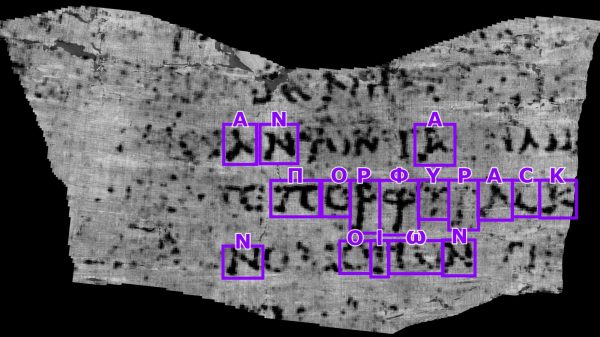Located in an ancient city near Pompeii in Italy rests the ruins of a large ancient Roman villa. When researchers were excavating the ruins they came across various logs of coal neatly placed in a stone bin. Upon further investigation, the coal logs were found to be the carbonized remains of ancient scrolls.
The site was determined to be a wealthy person’s home library. However, there was a problem: the scrolls were charred so badly by the eruption of Mount Vesuvius that they could not be unraveled or read, for fear they would disintegrate. Historians tried for centuries to get information from the scrolls but their efforts only yielded minimal success.
That was until 2023 when a 21-year-old college student from Nebraska, Luke Farritor, at last, was able to read a portion from one of the scrolls, the first human to do so in over 2,000 years.
How was this possible? How did he do it without disintegrating the fragile scroll?

The reality is that Luke never touched the scrolls; instead he relied on an amazing new technology that utilizes AI to scan and detect ink. The system then pieces the words together to virtually unravel a scroll. In 2019, the system detected ink which proved that the ink had not been vaporized in the carbonization process–only the paper changed.
The technology, developed in 2002, was not previously considered for use in the efforts to decipher the scrolls until Farritor used his computer knowledge to perfect the code and utilize the AI system required to read the scrolls.
The method utilized highly detailed X-rays, and when compiled with AI, the system can scan beyond the charred surface, and detect the ancient writing, Using the method so far, Luke read one passage from one of the scrolls.
The passage detailed previously unknown philosophical phrases that detailed sources of pleasure including music, the taste of capers, and the color purple. This is an amazing breakthrough but one that comes at a hefty price; it is estimated that the virtual unraveling of one entire scroll will cost 5 million dollars and 800 scrolls were found. Historians acknowledge that it is likely the whole collection will never be uncovered due to the total estimated price totaling over 4 billion.
Another primary reason is the fact that historians are familiar with the style of some of the phrases, meaning they can infer that nothing groundbreaking is contained in some or most of the scrolls.

However, they do plan to sample some of the passages in search of works from ancient Roman poets of whom they have no surviving examples, some of which include Ennius and Livius Andronicus, and to learn more about the ancient world and how records were kept.
Regardless of what all the scrolls say, this new ability to read them is groundbreaking and will open doors for the future collection of ancient information now without the need to touch the scroll.









































